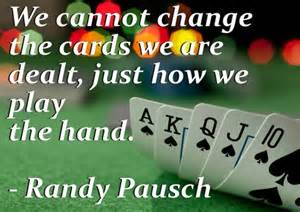I grew up in a day and age when as children, we spent as much time playing outside as possible. Hide and seek was a favorite game, and if you’ve played it you know that the seeker counts to a certain number and before heading out to find everyone says, “Ready or not, here I come!” If you weren’t ready for the seeker or if you weren’t totally tucked away in your hiding place, you were likely an easy target for the seeker.

And, so it is with change. Ready or not, here it comes and if you aren’t expecting it, you will likely be caught off guard by it. Even if you are expecting it, you aren’t always ready to deal with it especially with some of the consequences of it.

In November, I spoke to a women’s group in Bethel Park, PA on change, specifically changes older Americans face. We addressed four areas: health, lifestyle, technology, and perception of others. The health area generated much discussion and I frequently heard, “I am having a hard time accepting the physical changes I am now dealing with. I just can’t do as much as I used to.” Sound familiar? No matter what the change, sometimes we just aren’t ready to deal with the consequences of the change; we just aren’t ready to accept what the change is bringing or has brought.
It is important to remember that change happens all the time. And, sometimes, that change can be quite difficult to accept. It is also important to remember that change is a process and so is the accepting of it. This week’s post is for my Bethel Park friends and everyone else who is having trouble accepting an aspect of change in their lives. May this information help you with the process of change and the accepting of what change has brought.

Acceptance is a noun that has three specific meanings: receiving or taking something offered (e.g., the acceptance of a gift); welcoming or endorsing a person or thing (e.g., the acceptance of someone’s fiancé); and, assenting to something (e.g., acceptance of the reality of a situation). It is this latter meaning of acceptance that sets the stage for this week’s post.
Just as the person at the Bethel Park presentation isn’t happy with the physical changes she is experiencing as she gets older, she does, begrudgingly, accept the reality of the situation. And, oftentimes, that is what we do when we are not happy about what has changed but have no control over the change; we accede to the change; we yield to it. I found the following quote from http://www.idanceintherain.com most appropriate, “Do not see acceptance as a weakness. Accepting a situation does not mean you are giving up. Acceptance simply means that you recognize and understand your current situation. Acceptance allows you to be free from the shackles of denial and move forward in life, creating a new path and a new life for yourself.”

So, what are some things that we can do to recognize and understand the current situation, move forward and create a new path for ourselves? First, we must have the philosophy that nothing is permanent. Before change happens, remember that some things go and are replaced by new things. This is a fact of life. And, with some change, it is necessary for the old, the former to go so that the new can come. There is always a reason for the change (even those physical changes that accompany our getting older).

Whenever possible, anticipate the change. Change happens all the time; it is a natural part of our lives. If you can maintain an awareness that change can happen at any time, it will help you from being caught off guard when it does happen. (Knowing that changes in our physical abilities can happen as we age may help some take proactive measures to minimize future physical limitations, like exercising, strength training, etc.)
Adopt the viewpoint that change presents opportunities for growth. I may not be able to play tennis in the manner I used to. Can I play a modified version of the sport? Or, is there a different activity can I do? Perhaps now is the time to take up a form of dancing or something else I like but haven’t yet tried. 
Oftentimes with change, our first thoughts of it are negative. We need to change that mindset and think in a positive manner instead. Sometimes, accepting change is as easy as learning to think in a positive manner. We have all heard about the power of positive thinking. This is when we believe that whatever we face, we will be able to deal with it. OK. So, I can’t move the same way I did just a year ago. My knees may hurt when I try to run and make quick turns. I will stop doing that movement. I will be grateful that I am still able to walk unassisted. Maybe I will give water aerobics a try. I might be able to run and make quick turns in that environment. A side benefit of looking at the positive in every situation is that you maintain a relaxed composure.

For most, accepting change doesn’t happen all at once. Allow yourself to grieve for what has been lost or what has become different. While everyone grieves differently and more like being on a roller coaster than in discreet stages, the stages in the Kübler-Ross model are a helpful guide. Those stages are: denial (where we refuse to accept the facts; the reality of the situation; this isn’t happening to me!); anger (where we are emotionally upset; why is this happening to me?); bargaining (where we seek to negotiate a compromise; what if I…., I promise I’ll be a better person if only…); depression (extremely sad over what has happened; I don’t care anymore!); and, acceptance (the goal of the grieving process; OK, me; what is next? I am ready for whatever comes my way). Work through these stages and give yourself the time to come to terms with the change.

Being flexible can also help you accept the change. If you can focus your energy on making the best of things in situations over which you have no control, you won’t waste energy fighting what has changed. And, if you can make the best of the situation, you will have greater control over that situation. As Jonathan Lockwood Huie said, “You don’t have the power to make life “fair;” but you do have the power to make life joyful.”
Certainly, at my presentation to the Bethel Park group, the person who shared her concern over the physical changes she was experiencing was using an acceptance technique of acknowledging the loss and talking about it with others. Getting our thoughts and feelings “off our chest” can do wonders in moving us toward accepting what has or is changing. Use the “touchstones” in your life; your support system. Reach out to the people in your life with whom you are close and discuss with them what you are facing, feeling, sensing, etc.

Always keep things in perspective, stay in the present, and prioritize what is important. When we are unhappy or uncomfortable with the change or with what is changing, it is easy to focus on the past or the future. Neither is helpful because we can’t undo our have a do-over with the past and we have no control over the future. If we keep things in perspective and focus on the present, we can deal with the change as it is happening. (OK. So, I have some pain in my knees and I don’t move as well as I used to. I am still able to get around on my own. I don’t need assistance; no walker; no wheelchair. I can still do most of what I have been able to do.)

Change can be frightening. Getting moved out of our comfort zone is unsettling. Our comfort zone is like a child’s security blanket; we feel safe and secure when “wrapped” in the zone. Many become unsettled or fear change because of the unknown. We don’t know what is coming. We feel safe with predictability, sureness, and the routine. Change is like opening a door and not having any idea of what is on the other side; we step into the unknown. We lose that comfortable routine, that comfort zone, and that is scary and frightening. Accepting what is happening may be as equally as frightening as the change itself. HOWEVER, we cannot move forward until we’ve accepted what has happened; what has changed. Not accepting the change only makes the situation harder. As Eckhart Tolle advises, “To complain is always non-acceptance of what is. It invariably carries an unconscious negative charge. When you complain, you make yourself a victim. When you speak out, you are in your power. So change the situation by taking action or by speaking out if necessary or possible; leave the situation or accept it. All else is madness.”

Dr. Johnen Thanks for yet another helpful reminder that together we can help each other use each stage of life as an opportunity to grow emotionally and spiritually. As I age, I am constantly identifying the lies I have told myself about how attached I am to abilities, looks, or situations which belong to those much younger. Often I find my so called acceptance or non-attachment was simply a matter of being blessd in many ways. If something was never an issue I did not have to explore my attachment until that condition or situation became an issue.
Thanks for your insightful thoughts, Jimmy. Acceptance of many things, especially what change can bring, can be very difficult for many. Hopefully those who are struggling with accepting what change has brought their way will benefit from some of the ideas in this week’s post.
Thanks for sharing. Serendipitous that we posted photos of the same quote today.
Wow! What are the odds of that? That is an awesome quote and the more who see/read it, the better. Thanks for following and for your thoughts!